- Home
- Amanda Flower
Verse and Vengeance Page 11
Verse and Vengeance Read online
Page 11
I held up the book. “It was on Whitman.”
“Oh.” Her face brightened. “That’s Simon’s very favorite. It’s funny that would be the book Faulkner decided to throw. What a strange bird he is.”
I couldn’t argue with her there.
I said good-night to the rest of the Red Inkers. After they left, I closed and locked the door to Charming Books. It was time to water the tree.
Chapter Nineteen
I’d once asked my grandmother why we had to water the tree every other day with water from the natural springs, and she’d said because every time a Caretaker forgot, the tree began to wilt. As an academic accustomed to rigorous scholarship, that didn’t sit well with me. All I knew was that on the days I forgot the tree—I never claimed to be a perfect Caretaker—the tree wilted and its waxy leaves curled and fell from its branches. I’d also found that my shortcuts didn’t work either. Like gathering extra water and saving it to water the tree another day. The tree still suffered when I did that. It seemed to me that the only way to guarantee the tree’s health and the health of the essence was to water it every other day with fresh water from the springs. I hoped when I read the ledger my grandmother had given me that I would learn more about this.
Even though I was terribly worried about Jo and now about Rainwater because I knew his beloved sister was somehow involved in Redding’s death, I still had to water the tree. If I waited until the next day, the tree would suffer, as would the shop’s essence. I needed the essence to help me help Jo, so I didn’t see any choice other than to go after dark to lessen the risk of being seen. It was my duty, and one that I would carry until I passed it on to a daughter of my own, if I ever had one. No pressure.
I opted to walk to the springs along the well-worn path that led from our backyard to the edge of the park. I stopped at the garden shed before leaving the yard to grab the watering can I would need.
When I came out of the shed, Emerson was sitting by the gate with his skinny black tail whipping back and forth like a pendulum.
I put my hands on my hips. “Really?”
He smiled in the way only a mischievous cat can.
“Okay, fine,” I said to the cat. “You can come along, but stay close and don’t run off.” There was really no point in arguing with him.
He purred a response that sounded like a lawn mower firing up in the quiet wood.
When Emerson and I walked into the woods, a calm fell over me. I hadn’t realized how the tension of the day had affected me. Not that I was completely calm. I still didn’t know where Jo was. She wasn’t answering my text messages or emails. I promised myself that I would track Bobby down over the next few days. Jo worked for him. Maybe she’d told him where she’d gone and when she would be back. Or I could reach out to her brother again—but I didn’t want to create added strain there.
My footsteps were noiseless on the mulch-covered path that led to the springs, located in a break in the trees.
An enormous boulder twice my height in the hillside marked the beginning of the springs. Evergreen shrubs and moss covered the rocky wall, where a tiny waterfall, no larger than the width of a man, trickled down it and filled the pool, where I gathered the water. The constant movement of water from the hillside and bubbling up from the aquifer that ran the length of the village and broke to the surface in this one spot kept the water clear and free of algae and pests.
Moonlight broke through the trees, playing on the hillside and then on the pool of water below. Birch trees encircled the springs, and an owl hooted softly from a pale branch. It was tranquil. It was where I needed to be to calm my spirit. Emerson sat beside me at the edge of the pond as I dipped my watering can into the clear water. The can filled quickly, and as much as I wanted to stay there, I stood up, cradling the container and the precious water to my chest. I looked down at the little cat. “Let’s go home.”
He whipped his tail, and I took that as agreement.
We were halfway down the path when a snap sounded from deep in the woods. Emerson jumped onto my back and climbed up my sweatshirt to perch on my shoulder. I almost dropped the watering can and all its precious water. That single ominous sound had displaced any sense of tranquility, reminding me that I was a woman alone traipsing along the woods at night with a killer on the loose.
I patted his head. “It’s okay, buddy. It’s probably just a deer.”
He dug his claws into my skin.
“Emerson, that hurts. Get off of me.”
He hunched down, digging in even harder.
I set the watering can down on the path and tried to remove the cat from my shoulder. He wouldn’t budge. “Emerson, I’m not moving a step until you remove your claws.”
As if he understood what I said, he retracted his claws. I let out a sigh of relief and hoped they hadn’t drawn blood.
There was another snap of wood deep in the forest. Emerson’s claws dug into me again. The cat’s reaction had me thoroughly spooked. I didn’t bother to tell him to calm down again. All I could think of was Dahlia Waverly in these same woods nearly a hundred years ago. She had died collecting this water. Was that to be my fate too? There were people who killed for far less in this village. I knew that from my own experience.
Another twig snap spurred me into motion, and I ran the rest of the way home.
I didn’t feel safe until I was inside the shop and had locked the back door behind me. Emerson must have felt the same, because as soon as the bolt slid home, he retracted his claws and jumped from my shoulder.
“I’m sure it was just a deer,” I said.
He meowed in response. I didn’t think he was convinced, and neither was I. I walked through the swinging door that led from the kitchen into the main part of the shop. The shop was dark except for the moonlight coming through the skylight in the ceiling and through the front windows.
Faulkner flew from the sales desk to the top of the tree. He was a black shadow above me. Only when he was directly under the skylight could I make out his features.
Without ceremony, I poured the water into the dirt base around the birch tree, taking care to shake every last drop from the can. When I was done, nothing happened. It never did. With a sigh, I carried the watering can back into the kitchen. I would return it to its spot in the shed tomorrow. I wasn’t going back outside tonight after getting spooked in the woods.
I decided to text Jo again. I knew it was a long shot that she would reply. JO. THIS IS VIOLET. I WANT TO HELP YOU. TELL ME WHERE YOU ARE, AND I WILL COME TO YOU. I KNOW YOU ARE AFRAID. I’M HERE TO HELP.
I hit send and paced around the birch tree for the next ten minutes. There was no response. I sighed and shoved the phone in my pocket.
As I came around the tree for what must have been the twelfth time, Emerson was sitting at the foot of the stairs, as he always did when he thought it was high time we went to bed.
I glanced at the door. Rainwater had said he would stop by that night and tell me what was going on.
My phone pinged in my pocket. I jumped like I had been hit by a dart in the back. I was convinced it was Jo texting back. I looked at the phone and saw that it was from Rainwater. CAN’T DROP BY TONIGHT. SOMETHING CAME UP. WILL TRY TO CALL IF NOT TOO LATE.
My face fell, but I texted him back and told him I understood. I was starting to learn that this was just part of being in a relationship with a cop. You never knew when they would have time to see you.
Emerson was still on the step and meowed at me. “Okay,” I said. “Let’s go to bed.”
Faulkner cawed agreement. He never could truly rest until I took Emerson into my apartment for the evening. The crow was convinced the cat would attack him in his sleep, which wasn’t too far from the mark, if the way Emerson studied the crow with rapt attention was any indication.
Emerson and I headed up the stairs, and I let us into the apartment. In the middle of the sofa was another copy of Whitman’s poems that I knew I hadn’t left there, and no one else would have been
in my apartment since the Red Inkers had left for the night. I picked it up and found that it was open to the same poem the shop’s essence had revealed to me when the Red Inkers had been here. My eyes fell on the lines in the middle of the poem.
Have you guess’d you yourself would not continue?
Have you dreaded these earth-beetles?
Have you fear’d the future would be nothing to you?
Is to-day nothing? is the beginningless past nothing?
Was this what the murder was about? Death? Fear of it? I frowned and took the book into the bedroom with me.
I went to bed with Emerson the cat and Whitman the poet. I read Leaves of Grass late into the night, hoping I would hear from the police chief before too long. Much to my disappointment, I didn’t hear from Rainwater at all.
Chapter Twenty
The next morning, my body was not a happy camper. I had forgotten to take the aspirin Adrien had suggested. That had been a very poor life choice. Everything, and I mean everything, hurt, including my eyelashes. That’s how bad it was. I could barely hobble to the bathroom.
The hot water from the shower soothed my aching muscles, but my mind raced as I tried to understand why the shop wanted me to read Whitman. The beginning stanza in ‘To Think of Time’ was most certainly about death, but I felt like that clue from the shop was coming a tad late. There had already been a death, Redding’s death. If the shop’s essence was telling me death was coming, it should have done that prior to the bike race. Unless … fate had another death planned. I shivered as the water in the shower ran cold. I didn’t want to believe that. Perhaps it meant something else I wasn’t getting just yet, but I knew I would. I had to.
I was moving slower than normal when I went downstairs and opened the shop for the day.
I unlocked the front door just as Richard was coming up the walk. The evening before at the Red Inkers meeting, I’d asked him if he would be able to work in the shop that day. I knew I wouldn’t be able to be pinned down knowing that Bobby, Jo, Danielle, and possibly Rainwater might be in trouble.
“Thanks again for doing this,” I said, stepping aside.
“I don’t mind at all,” he said in his affable voice.
“I promise not to ask you to watch the shop so much. It’s just been a very strange start to the summer season.” I held up my hand when he started to talk. “And I know that it’s not exactly summer yet, but with the college out of session, I tend to think of it that way.”
Richard smiled. “I can see that. I suppose it’s less apparent to me, since I teach a few classes in the summer, but I’m very glad that I don’t have class today, which allows me to help you out.”
Faulkner flew down from the tree and onto his perch by the front window. “Off with her head,” he cawed as he went. It was his very favorite catchphrase. I wished my grandmother had never read him Alice’s Adventures in Wonderland.
At least it was a break from Whitman. My head was still spinning over his poems. Whitman was deceptively easy to understand, but only a close reader could recognize the deceit. Even his simplest poems had another layer or some other meaning that could be found there. Scholars had debated for over a hundred years whether or not that had been Whitman’s intent or if the poems should be taken at face value. My guess was Whitman would want his readers to go deeper. He had been hoping to reach into the hearts of the common man with his poetry.
Like most great artists, Whitman didn’t reach true fame and acclaim until long after he was dead. If Whitman had known this, it likely would have frustrated him to no end. He had been a proud man and wanted all the accolades he could get in life. It seemed to me that’s why he had toted Ralph Waldo Emerson’s letter so much. It was the encouragement he needed to keep going.
My cell phone rang in the back pocket of my jeans, shaking me from my thoughts about Whitman. I yanked the phone out, praying it was Rainwater. My grandmother’s face smiled back at me on the screen. I put the phone to my ear. “Good morning, Grandma Daisy.”
“Good morning, Violet. I have some exciting news for you.” I could hear the satisfied smile in my grandmother’s voice.
“What’s that?” I asked hesitantly. Exciting news in my book and my grandmother’s book could be two very different things.
“I solved the mystery of your necklace!” She said this like she was playing the game of Clue and had just caught Colonel Mustard in the conservatory with the candlestick.
“You have? What happened to it?”
“You will want to come down to the village hall to find out. I think it will be easier if you hear it firsthand. Can you come here?” she asked. “I know that you must have just opened the store, but you could close it for a little while.”
“There’s no need to do that,” I said. “Richard is here. I asked him to work today.”
“There’s my girl. You were always good at problem solving. When can you be here?”
“Five minutes?” I guessed. “I’m leaving now.”
“Good,” she said, and ended the call.
When I got outside, Emerson was already sitting in my bicycle basket. I put my hands on my hips. “You aren’t going with me. I’m going to the museum, and there are too many places there for you to hide.”
He licked his paw and then swiped it over his ear as if he hadn’t heard a word.
I grabbed at the cat to forcibly remove him from the basket, but he flattened his body against the wire mesh and curled his claws into the bottom of the basket. It didn’t matter how hard I tugged at him, he wouldn’t move. Emerson knew me well enough to know I wouldn’t do anything that might hurt him. Game point, Emerson, again.
I groaned. “I guess we’re both going to the museum.”
He popped his head out of the basket and smiled. There was no winning with that cat. Shaking my head, I climbed onto my mom’s old bike and strapped the violet helmet on my head. I coasted down the hill toward the Riverwalk. It was after ten in the morning, but the village was just waking up after the big race the day before.
Tourists quietly waited in line to get a breakfast table at Le Crepe Jolie, and others sipped coffee in paper cups as they strolled along the Riverwalk. I stopped my bike by the river. Emerson and I both stared at it.
The Niagara River sparkled this morning as the sunlight reflected off the small waves caused by the current rushing over the boulders and rocks, polished by thousands of gallons of water running over them for thousands of years. The wide river was like a beacon. I couldn’t help but wonder what the runaway slaves had thought when they happened upon the shore, knowing that on the other side, one short but dangerous swim away, was Canada and freedom.
Those feelings and questions were what my grandmother wanted to preserve through the museum. Despite all the grumbling from the village council and a few villagers about how expensive it would be to open and run, the village was for the most part behind the idea. Cascade Springs was very proud of its part in the abolition movement, as it should be.
I was so stricken by the river’s beauty, I didn’t notice Fenimore approaching me.
“It’s not often I see someone riding a bicycle with a cat in the basket,” he said. He was dressed in his troubadour outfit of worn jeans and flannel shirt, his hair tied back with a piece of leather. His harmonica hung from a wire around his neck, and his guitar was slung over his arm.
I swallowed as emotions flooded my body. Hurt, anger, frustration, and confusion. They were all there. It was as if I was running through all the stages of grief in a matter of seconds.
Emerson braced his white front paws on the edge of the wire basket and cocked his head. He seemed to be studying Fenimore, trying to decide if he was friend or foe. Fenimore let the little tuxie smell his hand, and then he scratched Emerson between the ears. The cat leaned into the scratch. Traitor.
When I didn’t say anything, Fenimore went on to say, “I heard that you were in the bike race yesterday, and there was an accident. I’m happy that you weren’t hurt.�
�
I bit back a sharp retort asking him why he would even care. He hadn’t cared for me most of my life, so why the change of heart now that I was thirty years old? It seemed more than a little late for me. Instead I said, “Are you in the village for the race? I thought you would have gone home by now.”
“I thought when I saw you yesterday …” He trailed off.
“What?” I asked as I removed my helmet and hopped off my bike. I wasn’t making it easy for him, and we both knew it.
“I wanted to talk to you again. I didn’t like how we left it last year. I was a coward. I should have tried to reach out to you.” He adjusted his guitar strap on his shoulder. “I’m sorry for that. Did you read the letter?”
“I did.”
“Did you tell anyone about …?”
“Only Grandma Daisy.”
He nodded. “That’s right. She should know. She has a right to know.” He looked out at the river. “She should have known a long time ago.”
“We both should have.” I cleared the lump from my throat. “I need to go. Grandma Daisy wanted me to meet her in the village hall.” I turned toward the street, ready to walk my bike across. I would have run for it, but just then a horse and carriage with tourists inside clomped down the street, blocking my path. As the driver led the horses by, I heard him say, “The village hall was built in the 1850s, and now Cascade Springs is adding an underground railroad museum to it. You will want to come back for that. Let me tell you about the village before and during the Civil War …”
The carriage stopped me long enough for Fenimore to try again. “Violet, can we talk? There are things I need to tell you. Things you deserve to hear.”
As if against my own will, I turned my head to meet his gaze. There were tears in his eyes, and I felt myself soften toward him. “Stop by the shop later today,” I said, before I could change my mind. “We can talk there.”
He nodded. I crossed the street and didn’t look back.

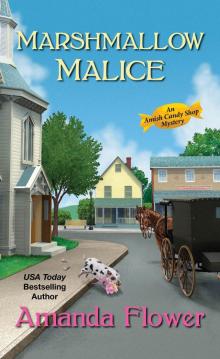 Marshmallow Malice
Marshmallow Malice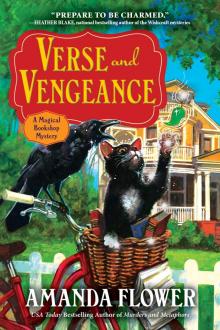 Verse and Vengeance
Verse and Vengeance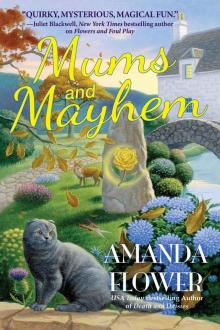 Mums and Mayhem
Mums and Mayhem Toxic Toffee
Toxic Toffee Criminally Cocoa
Criminally Cocoa Assaulted Caramel
Assaulted Caramel Maid of Murder aihm-1
Maid of Murder aihm-1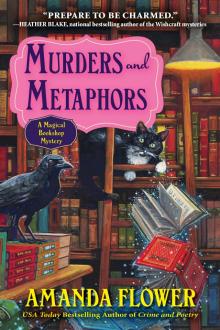 Murders and Metaphors
Murders and Metaphors Matchmaking Can Be Murder
Matchmaking Can Be Murder Maid of Murder (An India Hayes Mystery)
Maid of Murder (An India Hayes Mystery)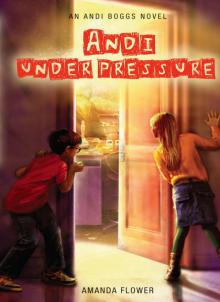 Andi Under Pressure
Andi Under Pressure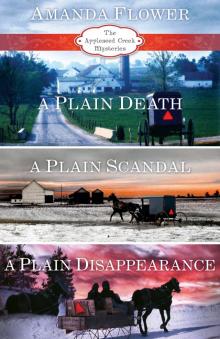 Appleseed Creek Trilogy, Books 1-3
Appleseed Creek Trilogy, Books 1-3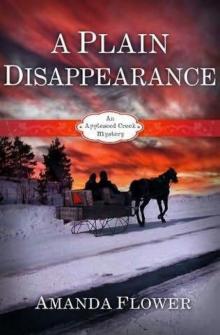 A Plain Disappearance
A Plain Disappearance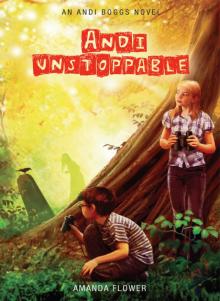 Andi Unstoppable
Andi Unstoppable The Final Vow
The Final Vow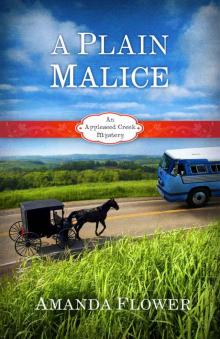 A Plain Malice: An Appleseed Creek Mystery (Appleseed Creek Mystery Series Book 4)
A Plain Malice: An Appleseed Creek Mystery (Appleseed Creek Mystery Series Book 4)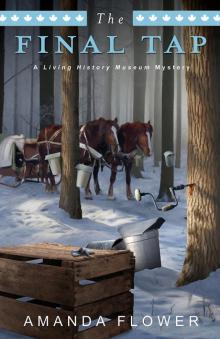 The Final Tap
The Final Tap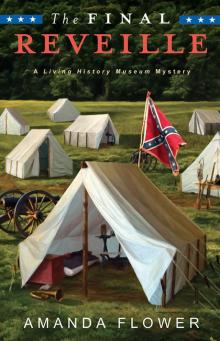 The Final Reveille: A Living History Museum Mystery
The Final Reveille: A Living History Museum Mystery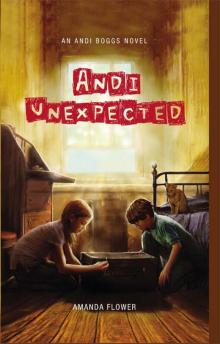 Andi Unexpected
Andi Unexpected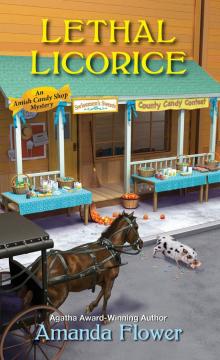 Lethal Licorice
Lethal Licorice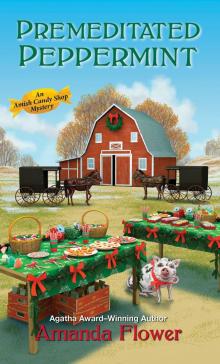 Premeditated Peppermint
Premeditated Peppermint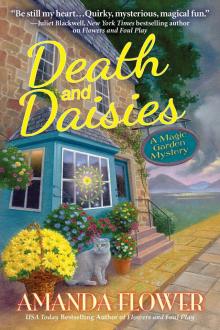 Death and Daisies
Death and Daisies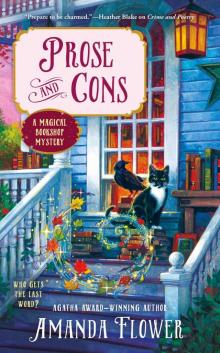 Prose and Cons
Prose and Cons